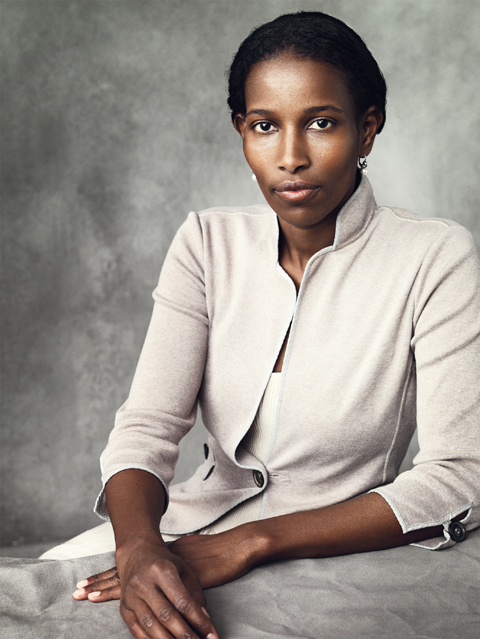
"I MISS MY PARENTS" Hirsi Ali. |
As a news reporter, I’ve interviewed presidential candidates and prison inmates. But I’ve never encountered an interview subject with security constraints so strict that their staff wouldn’t even give me his/her phone number.
But such was the case with Ayaan Hirsi Ali, who will travel to Providence on Friday, October 18 to speak on the “Clash of Civilizations: Islam and the West” as part of the Central Congregational Church’s Darrell West Lecture Series on Religion and Politics. When I asked to interview Hirsi Ali in advance of her visit, I received an email from an assistant that said, “Per security reasons,” I would not be given her phone number. She would call me, the assistant said.
Twenty-four-hour security has been a way of life for Hirsi Ali since 2004, when Theo van Gogh — the great grandnephew of Vincent van Gogh and the director of a film she had been making on Islam — was murdered by a Muslim radical in the streets of Amsterdam, with a letter pinned to his chest warning she was next.
Hirsi Ali is no stranger to the brutalities of fundamentalist Islam. Born in Mogadishu, Somalia in 1969, she experienced genital mutilation as a young girl and later sought asylum in the Netherlands to escape a forced marriage in 1992.
Her journey out of Islam, however, took longer. (“I didn’t just wake up one day thinking ‘Oh my goodness, Enlightenment!’ It was a very gradual process,” she told me.) After studying political science at the University of Leiden, she served in the Parliament from 2003 to 2006, becoming a controversial figure because of her critical statements on Islam. In 2005, she made Time’s list of the “100 Most Influential People.” Then, after a failed attempt by a cabinet minister to revoke her Dutch citizenship, Hirsi Ali resigned from Parliament and moved to the United States, becoming a naturalized citizen earlier this year.
Hirsi Ali — who has written several books, including The Caged Virgin, and a two-part autobiography, Infidel and Nomad — is now a fellow at the Harvard Kennedy School and a visiting scholar at the American Enterprise Institute in Washington, DC. She is also the founder of the AHA Foundation, which advocates for the rights of women who are the victims of religious or culturally-based oppression.
Our conversation has been edited and condensed.
YOUR STORY IS UNIQUE IN THAT YOU’VE JOURNEYED ACROSS THE “CLASH OF CIVILIZATIONS,” FROM ISLAM TO THE WEST. DID ANY AUTHORS PARTICULARLY INFLUENCE YOUR JOURNEY? As a girl growing up in a Muslim home and being brought up in the Muslim religion and practice and living in Nairobi, I was very lucky to have had access to education and Western education. And, yes, I read Nancy Drew and Hardy Boys and several other works of literature and trashy novels. It made me dissatisfied with my life, the idea that there were girls like Nancy Drew solving mysteries and playing policeman while we were covering ourselves up. I lived in a life of curfews, where my mother locked the door after school.